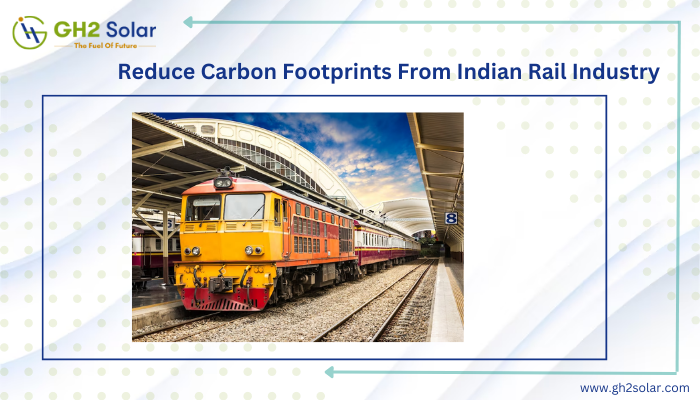The push to reduce CO2 emissions (greenhouse gas) has led to increased interest in green hydrogen as a potential solution for decarbonizing the transportation sector. One area where this technology is being explored is in the rail industry.
According to NITI Aayog data, CO2 emissions from the Indian Railway were approximately 6.84 million tons in 2014. To reduce its dependency on fossil fuels and decrease its carbon emissions, the Indian government is focusing on electrification, as an electrified railway system can more easily transition to clean energy alternatives such as Green hydrogen offers a promising solution to power trains with zero carbon emissions.
The Indian Railways have begun investigating the use of green hydrogen as a train fuel. For instance, it had requested bids for hydrogen fuel cell trains, and initially, two diesel-electric trains in Haryana’s Jind-Sonipat segment will be modified to run on green hydrogen fuel cells.
For the switch from fossil fuels to green hydrogen, many obstacles must be overcome. The price and complexity of its production are one of the main obstacles. The government will need to provide significant support for the green hydrogen industry, which is still in its early stages of development.
In this blog, we know about Green Hydrogen Trains and the Government’s movements toward it:
What are hydrogen trains?
Hydrogen trains are a type of train that uses hydrogen fuel cells instead of diesel engines to generate electricity. These cells work by combining hydrogen and oxygen to produce electricity that powers the train’s motors, with only water and a small amount of heat produced as by-products. Compared to diesel-powered trains, hydrogen trains offer a more environmentally friendly alternative, as they do not emit harmful pollutants like carbon dioxide, nitrogen oxides, or particulate matter. Moreover, hydrogen can be sourced from renewable energy sources like wind, solar, or hydropower, ensuring a clean and renewable fuel supply for the train.
Routes mapped for initial journeys
To highlight India’s rich cultural and natural heritage, the hydrogen trains will commence their journey on the historic, narrow-gauge heritage routes operated by the Kalka-Shimla Railway, the Darjeeling Himalayan Railway, the Nilgiri Mountain Railway, the Matheran Hill Railway, and other similar routes. The Railway Minister’s objective is to create an environmentally sustainable travel experience on these routes, which are part of India’s cultural heritage.
In addition, new circuits like Guru Kripa, which links all the places associated with Guru Nanak, will be added to the list of routes. This move will make heritage routes on the Indian Railways completely green. Railway Minister Ashwini Vaishnaw also announced the awarding of a pilot project to retrofit existing Diesel Electric Multiple Unit (DEMU) trains with hydrogen fuel cells and ground infrastructure for Rs 111.83 crore. These trains are planned to be run on the Jind-Sonipat section of the Northern Railway, and field trials of the prototype are expected to begin in 2023-2024.
India’s hydrogen train: How will it work?
At a time when the world is increasingly focused on reducing carbon emissions and embracing green technology, hydrogen-powered trains are being viewed as a promising solution for the transportation sector. In India, the government is taking significant steps towards green transportation with the launch of the country’s first hydrogen-powered train, set to run on historic heritage routes by December 2023.
While the use of hydrogen as a fuel offers numerous environmental benefits, it comes at a higher initial cost. The government has acknowledged that the running cost of hydrogen fuel trains will be higher, to begin with, but will subsequently reduce as the number of trains increases. The economic benefits of achieving zero carbon emission goals also make it a viable option for transportation in the long run.
Despite the promising potential of hydrogen-powered trains, the major obstacle is the high cost. According to the research and ratings agency ICRA, green hydrogen costs around Rs 492/kg in India, which is significantly more expensive than diesel fuel. Additionally, the cost of operating a fuel cell-based hydrogen train is estimated to be 27 percent higher than that of a diesel-powered train, considering various other factors.
Government Initiative
By December 2023, Indian Railways plans to introduce the first hydrogen-powered train in the nation, giving the nation’s transport system a significant boost in terms of going green.
The hydrogen train will be manufactured domestically and will initially run on historic circuits like Kalka-Shimla, according to Railway Minister Ashwini Vaishnaw, who spoke at a press conference on February 1 following the announcement by Finance Minister Nirmala Sitharaman of the highest-ever capital outlay for the railways in the 2023 Budget of Rs 2.40 lakh crore.
Vasihnaw informed the Rajya Sabha on February 3 that as part of its “Hydrogen for Heritage” initiative, Indian Railways will operate 35 hydrogen trains on various heritage and hill routes at an estimated cost of Rs 80 crore for each train and Rs 70 crore per route for ground infrastructure.
We At GH2 Solar
GH2 Solar is a technology-oriented company that has vast experience in executing oil and refineries solar rooftop & large-scale utility projects across India. Being already experienced in the renewable sector, now we are working on the development of “Green Hydrogen” & HAAS (Hydrogen as a Service). If you are planning to adopt Green Hydrogen, you can connect with GH2 Solar to get all information about the same.
For more information, please give us a call at 1800-102-8685
For more updates, follow us on linkedin








